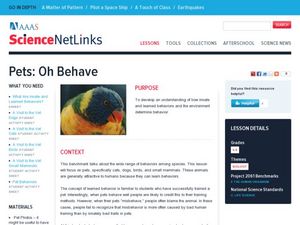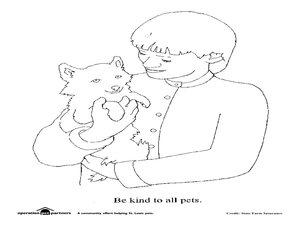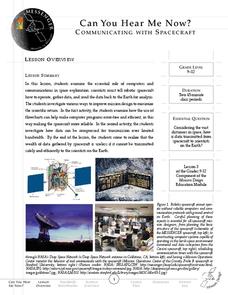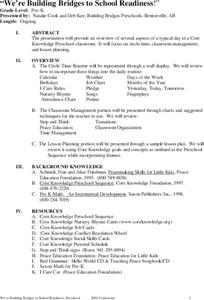Curated OER
Pets: Oh Behave
Students develop an understanding of how innate and learned behaviors and the environment determine behavior. They see how a variety of factors affects our pet's behavior-including species-specific traits, the environment, training, and...
Curated OER
Instinct vs. Learned Behavior
Fifth graders engage in a discussion about learned vs. instinctive behaviors. They list of behaviors on the board with the help of Students. They go back through the list and use two symbols, one for instinctive and one for learned.
Curated OER
Basic Animal Behavior in Domesticated Animals
Students investigate animal behavior, examining the nervous system and the physiology of the brain and the fight or flight response. They simulate animal behaviors and discuss the difference between an instinct and a behavior.
Curated OER
Pets: Oh Behave
Students develop an understanding of how innate and learned behaviors and the environment determine behavior.
Curated OER
Types of Behavior
In this science worksheet, students analyze specific animal and human behaviors and classify them as innate or learned. Students answer 20 questions, identifying behaviors and explaining how they are helpful to the animal. Note: This...
Curated OER
Basic Knowledge of Big Cats
First graders create a KWL chart on big cats. In this animal science lesson, 1st graders brainstorm what they already know about big cats and research big cats using various suggested websites. Students fill in the last column of the KWL...
Curated OER
4-H Cat Activity Page
As part of a unit on animals, this would be an interesting activity for upper elementary and middle school students. The 40 question activity could be linked to a research activity on animals or pets.
Curated OER
What's All the Buzz About
Students participate in a game of charades to examine different animal behaviors. After reading an article, they discuss why bees waggle and how that behavior applies to humans. They research the behaviors of an animal of interest to...
Curated OER
Fabulous Felines
Students learn how cats communicate with humans. For this non verbal communication lesson, students learn how cats communicate with humans. Students discuss how they communicate their thoughts and feelings and the differences between...
Curated OER
How to Speak Cat
Students explore feline communication. In this comprehension lesson, students discuss how to read animal body language. Students look at images of cats and decide what the animal is trying to say.
Resources for Educators
Math & Science Connection
Whether you're using a collection of Dr. Seuss books to teach basic math skills like counting, adding, and subtracting, or exploring the different states of matter by melting a crayon with a hairdryer, a series of 11 fun activities...
Messenger Education
Can You Hear Me Now?—Communicating with Spacecraft
Radio signals transmitted to Pluto take five hours to reach their destination! In these two activities, young scientists explore data communication in space. In activity one, pupils learn how data is gathered and sent back to Earth....
Curated OER
Pets: Oh Behave
They say that a dog is a man's best friend. Why is that? Discuss with your class why people like pets and the responsibilities with owning one. They read an article about pet behavior and write a short essay comparing one of their...
Curated OER
Curiosity Does Not Kill The Cat
Students list the different ways they could test a guinea pig, a dandelion, and their brother (or sister)? They create a data chart in their group that lists the organism, what they could measure, and how they could change that measurement.
Curated OER
Dogfighting Lesson Two - Bite Prevention and Community
Students discover how to prevent dog bites by completing worksheets and watching a video. In this animal safety lesson, students view a video called Dogs, Cats and Big Kids, taking notes throughout. Students take a quiz and create a...
Curated OER
Creeping and Crawling Observing Mealworms and Earthworms
Students observe the inherited traits in earthworms and mealworms. In this organisms activity, students view a live mealworm and earthworm on a tray and identify the body parts. Students measure the worms and observe the behavior....
Curated OER
Rhyming With Ramon
Pupils examine healthy behaviors to avoid the flu. They repeat words that rhyme, sing a song, and repeat a chant and act out the verses to reinforce healthy behaviors to avoid the flu.
Curated OER
We're Building Bridges to School Readiness!
Students participate in the activities their teaching initiates from the packet for classroom behavior, social skills, and learning environments.
Curated OER
The Human Brain's Capacity for Language
Incorporate this slide show into your lecture about speech, language, psychology, or physiology. Addressing the structure of the brain as well as handedness and aphasia, the presentation could fit the needs of many different lecturers....
Curated OER
A Bug's Life: Diary of an Insect's Metamorphosis
Fifth graders examine the stages of insect's to understand heredity. For this inherited traits lesson, 5th graders explore the life of the honeybee for its inherited traits. Students recognize the difference between inherited traits and...
Curated OER
Animal Signs
Students discuss the many different types of animal signs that can be used to identify and track animals. They participate in an hands-on activity in which they examine tracks, trails, homes, territory markings, and even "scat" left by...
Curated OER
Enrichment Activities - "Mrs. Frisby and the Rats of NIMH"
Fifth graders read the novel "Mrs. Frisby and the Rats of NIMH." They discuss the various characters in the book, and the different types of conflict that take place within the book. They also research owls and rats to make comparisons...
Curated OER
Peanut Butter Broccoli
Fifth graders explore food production by viewing DNA presentations. In this genetic engineering lesson, 5th graders discuss the foods they typically eat at home and how many common foods are engineered in a way that can produce a bigger...
Curated OER
Rock, Paper, Scissors
Fifth graders explore genetic traits. In this genetic traits lesson, 5th graders investigate dominant and recessive traits. Students identify similar traits between a parent organism and its offspring.

























